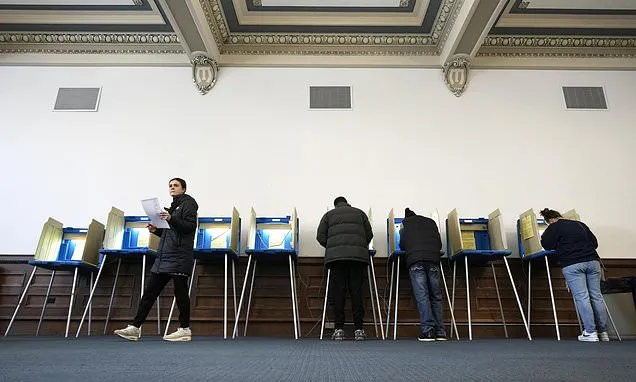WASHINGTON (AP) - House Republicans on Thursday are expected to take up one of President Donald Trump´s top election-related priorities, legislation that would require proof of citizenship when registering to vote for federal elections.
Trump has long signaled a desire to change how elections are run in the U.S. and last month issued a sweeping executive order that includes a similar citizenship requirement among other voting-related changes. Democrats and voting rights groups say the requirement could disenfranchise millions of Americans who lack ready access to the proper documents.
Top Republicans say the Safeguard American Voter Eligibility Act is necessary to ensure that only U.S. citizens cast ballots and "cements into law" Trump´s recent order, which is the subject of multiple lawsuits.
"If we have a noncitizen who votes in an election, that cancels out the vote of a legal citizen," said U.S. Rep. Bryan Steil, a Wisconsin Republican who chairs the House Committee on Administration, which handles election-related legislation.
Republicans hammered on the issue during last year´s presidential election, even though voting by noncitizens is rare, already is illegal and can lead to felony charges and deportation.
This marks the GOP´s second attempt at passing the SAVE Act. As with the last Congress, the bill is unlikely to be approved in the Senate against Democratic opposition. Republicans have a narrow majority that falls short of the 60 votes they would need to overcome a filibuster.
The SAVE Act would require all applicants using the federal voter registration form to provide documentary proof of citizenship in person at their local election office. Among the acceptable documents are a valid U.S. passport and a government-issued photo ID card presented alongside a certified birth certificate.
Democrats and voting rights groups warn the legislation could lead to widespread voter disenfranchisement if it were to become law. The Brennan Center for Justice and other groups estimated in a 2023 report that 9% of U.S. citizens of voting age, or 21.3 million people, do not have proof of their citizenship readily available. Almost half of Americans don´t have a U.S. passport.
In Kansas, a proof-of-citizenship requirement that passed in 2011 ended up blocking the voter registrations of more than 31,000 U.S. citizens in the state who were otherwise eligible to vote. The law was later declared unconstitutional by a federal court and hasn´t been enforced since 2018.
"The SAVE Act would force American citizens into a paperwork nightmare, turning every voter registration into a bureaucratic tsunami of government red tape," said Rep. Joe Morelle, a Democrat from New York who testified recently in opposition to the bill.
A further concern: Married women would need multiple documents to prove their citizenship if they have changed their name. It was a complication that arose in town hall elections held last month in New Hampshire, which was enforcing a new state law requiring proof of citizenship to register. One woman, since divorced, told a local elections clerk that her first marriage was decades ago in Florida and that she no longer had the marriage certificate showing her name change. She was unable to register and vote for her town election.
Republicans have defended the legislation as necessary to restore public confidence in elections and say it allows states to adopt procedures to help voters comply. They have disputed Democratic characterizations of the bill.
"The truth is, those who were registered to vote would still be able to vote under their current registration," said Rep. Chip Roy, a Texas Republican who sponsored the bill. "We have mechanisms giving the state fairly significant deference to make determinations as to how to structure the situation where an individual does have a name change, which of course is often women."
Adrian Fontes, a Democrat who serves as Arizona´s top state election official, described the proposal as a solution in search of a problem, given how rare noncitizen voting is.
"What it is doing is capitalizing on fear -- fear built on a lie," Fontes said. "And the lie is that a whole bunch of people who aren´t eligible are voting. That´s just not true."
